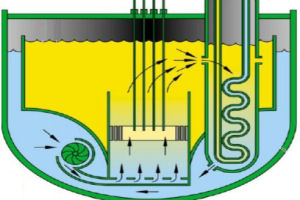July 20, 2011
The 1mEuro project is called SARGEN IV, which stands for 'Safety Assessment of Reactors of Generation IV'. The money has been provided from the EC Euratom Framework Programme.
The outcome of the University of Manchester research will be key in defining the future EU research agenda for the successful implementation of this advanced technology.
Generation IV reactors are evolutionary in design and so will be able to ‘burn’ plutonium created from the spent fuel from pressurised water reactors (PWR).
This will allow them to improve the efficiency of the fuel cycle and form an option for the UK when its expected new fleet of PWRs has been built and is operational – forecast to be in about 2040.
Being evolutionary, they will be the state-of-the-art in design and types of materials used and will have a high level of nuclear safety.
The safety claims will need assessing before their deployment and the objective of this project is to identify what the critical issues might be, to develop a roadmap for necessary research to address them and assist with the development of a safety assessment approach for the licensing of these new designs of reactor.
The consortium is led by IRSN, the French Technical Support Organisation and has all the key European players involved in Gen IV reactor research.
Professor Peter Storey, from the Dalton Nuclear Institute, will lead the development of a roadmap for FAST reactor safety R&D and, with Dr Tim Ware from the School of Physics and Astronomy, will be involved in identifying safety features of Gen IV reactors, identifying accident initiators and disseminating findings of the project.
Professor Storey said: “Involvement in this prestigious EC funded project on advanced nuclear reactors is of strategic importance to the Dalton Nuclear Institute.
“It builds on our involvement in two other European projects in this area, draws upon our high expertise in reactor technology and nuclear safety and involves the Institute in helping set the agenda for ground breaking research."
The project will start in early 2012 and last for two years. It will build upon other EC funded Gen IV projects that the University is already involved in and will act as a key step in engaging specialist expertise within the Centre for Nuclear Energy Technology (C-NET) in European projects that will grow as interest in advanced systems also grows.
The Generation IV International Forum (GIF) was chartered in 2001 to lead the collaborative efforts of the world's leading nuclear technology nations to develop next generation nuclear energy systems to meet the world's future energy needs.
The GIF Charter has been signed by Argentina, Brazil, Canada, France, Japan, the Republic of Korea, South Africa, the United Kingdom, the United States (2001), Switzerland (2002), Euratom (2003), the People's Republic of China and the Russian Federation (2006).
Among the signatories of the Charter, Canada, Euratom, France, Japan, the People’s Republic of China, the Republic of Korea, Switzerland and the United States have signed a Framework Agreement (FA) formally agreeing to participate in the development of one or more Generation IV systems.
These revolutionary “Generation IV” nuclear energy systems will be developed in the context of eight technological goals:
- to provide sustainable energy generation that meets clean air objectives and provides long-term availability of systems and effective fuel utilization for energy production
- to minimize and manage nuclear waste and notably reduce the long-term stewardship burden, thereby improving protection for the public health and the environment
- to have a clear life-cycle cost advantage over other energy sources
- to have a level of financial risk comparable to other energy projects
- to excel in safety and reliability
- to have a very low likelihood and degree of reactor core damage
- to eliminate the need for offsite emergency response
- to be very unattractive and the least desirable route for diversion or theft of weapons-usable materials, and provide increased physical protection against acts of terrorism.

0 comments:
Post a Comment